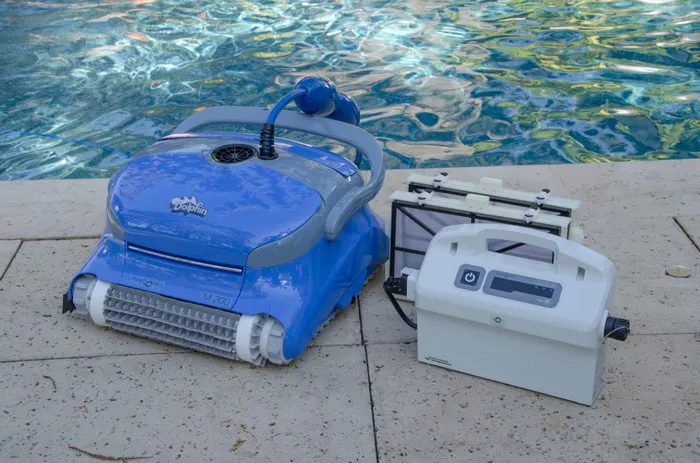Maintaining a clean and debris-free swimming pool is essential for both the health of swimmers and the aesthetics of the pool area. In this article, we delve into the distinction between pool cleaners and pool vacuums, shedding light on their functions, types, effectiveness, maintenance requirements, and cost considerations.
Importance of Pool Maintenance
Before delving into the specifics of pool cleaners and vacuums, it’s crucial to highlight the significance of regular pool maintenance. Clean pools not only provide a more enjoyable swimming experience but also minimize health risks associated with bacteria, algae, and other contaminants that thrive in unclean water.
Definition and Function
Pool Cleaner
Pool cleaners are automated devices designed to clean and maintain the cleanliness of swimming pools. They typically employ a combination of brushes, scrubbers, and suction to remove debris from pool surfaces and walls.
Pool Vacuum
On the other hand, pool vacuums are devices specifically designed to vacuum or suction debris from the pool floor. They can be either manual or automated, requiring connection to a filtration system or operating independently.
Types of Pool Cleaners and Vacuums
Pool Cleaners
1. Suction-Side Pool Cleaners: Attach to the suction line of the pool’s filtration system.
2. Pressure-Side Pool Cleaners: Connect to the return line of the pool’s filtration system and use pressure to propel them around the pool.
3. Robotic Pool Cleaners: Fully independent units with built-in filters and motors, operating on their own power source.
Pool Vacuums
1. Manual Pool Vacuums: Operated by hand and connected to a telescopic pole and hose, often requiring manual movement around the pool.
2. Automatic Pool Vacuums: Autonomous devices that move around the pool floor automatically, powered by electricity or water pressure.
Coverage and Cleaning Method
Pool Cleaners
Pool cleaners provide comprehensive cleaning by scrubbing and brushing pool walls and surfaces while simultaneously collecting debris. Some models may include additional features such as navigation systems or programmable cleaning cycles.
Pool Vacuums
Pool vacuums primarily focus on suctioning debris from the pool floor, although some models may include brushes or scrubbers for light surface cleaning. They typically clean in a systematic pattern, covering the entire pool floor during each cleaning cycle.
Effectiveness and Efficiency
Pool Cleaners
Due to their comprehensive cleaning action, pool cleaners are generally more effective at removing algae, dirt, and debris from pool surfaces and walls. They can also be more efficient for larger pools or pools with irregular shapes, as they cover more surface area during each cleaning cycle.
Pool Vacuums
Pool vacuums are effective at removing debris from the pool floor, particularly larger particles like leaves and twigs. However, they may require multiple passes or manual intervention to ensure thorough cleaning, especially in hard-to-reach areas.
Maintenance and Operation
Pool Cleaners
Pool cleaners typically require minimal maintenance beyond occasional cleaning of filters or debris bags. Once set up and programmed, they operate autonomously, requiring minimal user intervention.
Pool Vacuums
Pool vacuums may require more frequent maintenance, including cleaning or replacing filters and emptying debris bags or baskets. Manual pool vacuums also require physical effort and manual maneuvering by the user.
Cost Considerations
Initial Cost
Pool cleaners, especially robotic models, tend to be more expensive upfront due to their advanced features and technology. In contrast, pool vacuums, particularly manual models, are generally more affordable.
Long-Term Costs
Pool cleaners may have lower long-term costs due to their autonomous operation and lower maintenance requirements. Conversely, pool vacuums may incur higher long-term costs due to ongoing maintenance and potential replacement of parts.
User Preferences and Pool Characteristics
Consideration of pool size, shape, cleaning needs, and user convenience is essential when choosing between pool cleaners and vacuums. Autonomous operation versus manual intervention, as well as the level of debris accumulation in the pool, should also be taken into account.
Conclusion
In conclusion, pool cleaners and pool vacuums serve distinct purposes in maintaining clean and debris-free swimming pools. While pool cleaners offer comprehensive cleaning of pool surfaces and walls, pool vacuums focus primarily on suctioning debris from the pool floor. The choice between the two depends on factors such as pool size, shape, cleaning needs, user preferences, and budget constraints. Ultimately, selecting the right device is crucial for ensuring efficient and effective pool maintenance.

